Patrologiae Cursus Completus: Series Graeca (167 vols.)
Digital Logos Edition
This product has been transferred from Community Pricing to Pre-Pub. The actual funding level may be lower than it appears, which could delay production. The amount of funding still needed will be evaluated and updated soon.
The Original Patrologia Graeca Available Online
Jacques Paul Migne’s Patrologiae Cursus Completus: Series Graeca forms the largest collection ever published of the extant writings of the Greek Fathers and Doctors of the early and medieval Church. It served as the translation base for Philip Schaff’s Early Church Fathers and has been the bedrock for theological and historical studies of the time period extending from the Apostolic Fathers in the late first or early second century to the fifteenth century.
Between 1857 and 1866, the abbé Jacques Paul Migne, an industrious French priest, published the 161 volumes that make up the Patrologiae Cursus Completus: Series Graeca, roughly translated “Complete Course on Patrology, Greek Series,” and commonly referred to as “Patrologia Graeca” (PG). These volumes contain much of the available witness in Greek to the writings of the Fathers of the early and medieval Church.
An Indispensable Resource for Greek Scholars and Academics
Each volume of the Patrologia Graeca contains not only the Greek editions of the writings of the Fathers, but also lengthy dissertations, introductions, and other supplementary material. Many editions even contain notes on textual variants found among other manuscripts, along with explanatory material written in Latin. In addition to the 161 volumes of the PG (166 print vols.), the Logos Edition also includes the later published index to the Patrologia Graeca compiled by Ferdinandus Cavallera. With it, you can find entries by author, work, date, or subject.
The thirty-eight-volume edition of the Early Church Fathers, edited by Philip Schaff, used many of the Patrologia Graeca volumes as its translation base, but the Patrologia Graeca contains many works of the Church Fathers not translated by Schaff and not available in English.
Be sure to also get Migne's monumental work on the Latin Fathers, the Patrologiae Cursus Completus: Series Latina (221 vols.). And to round out your collection of the church Fathers in their original languages, don't forget the Patrologia Syriaca (vols. 1-2) and Orientalis (vols. 1-14, 16) which contain the Arabic, Armenian, Coptic, Ethiopic, Greek, Georgian, Slavonic, and Syriac writings of the Fathers of the Eastern Church.
- Rare access to the most important reference work for the Greek Fathers
- The most exhaustive collection of writings from the Greek Fathers and Doctors of the Church
- Over 110,000 pages of primary source documents in their original language
- Introductions, discourses, and critical apparatuses for the Greek Fathers
- The later published index of authors, works, dates, and subjects
- Links to other Logos books, including the English translations found in Philip Schaff’s Early Church Fathers
Incorporating Migne’s Patrologia Graeca into your Logos Library
For those who have the Logos Editions of Schaff’s Early Church Fathers, the Patrologia Graeca encodes links to the material in common, allowing access to an English translation. More importantly, for those wanting to read the texts translated by Schaff in the original language, the Patrologia Graeca is a must. For example, with the Patrologia Graeca, you can read in the original language the writings of the Cappadocian Fathers whose works were so important for precisely formulating the doctrine of the Trinity against Sabellianism on the one hand or tritheism on the other.
These volumes are not facsimile editions of page scans; they are full-blown, full-text Logos resources. Search, for example, for every occurrence of the words θεοτοκος or ομοουσιος to trace the important debates surrounding the deity of Christ. (Morphological tagging may be added later depending on interest.) Each volume of the Patrologia Graeca is navigable by page number or column number (the primary method of citation of the Patrologia Graeca), linked to many Logos books, and indexed by author and work. Further detail (chapter, section, verse) will depend upon each work itself and reflect the divisions marked by Migne.
A new era was initiated in the 19th century by the Frenchman J.-P. Migne (1800–1875), who was the first to publish all the works of the church fathers according to the best available editions. His Patrologia latina appeared in 221 volumes (1844–64), and, with Latin translations, his Patrologia graeca in 161 volumes (1857–66) . . . scholars all over the world continue to depend on them . . .
—The Encyclopedia of Christianity, vol. 4, by Erwin Fahlbusch and Geoffrey William Bromiley
Students should be especially alert to the value of both the contents of and the indices to the major series edited by Jacques-Paul Migne, the Patrologia Latina and the Patrologia Graeca.
—Church History: An Introduction to Research, Reference Works, and Methods, by James E. Bradley and Richard A. Muller
The most complete collection of patristic texts, which needs to be consulted when no critical text is available . . .
—A Basic Bibliographic Guide for New Testament Exegesis, by David M. Scholer
. . . the two Patrologia remain the standard edition for much of the religious Latin and Greek literature of the patristic and medieval periods.
—A Global Encyclopedia of Historical Writing, vol. 2, by D. R. Woolf
Not only does it usually give the best texts which were available at the time of its publication, but it adds to them a store of notes, introductions, and dissertations by well-known Patristic scholars.
—Patristic Study, by Henry Barclay Swete
. . . PG and PL are still the standard means of reference and citation for most patristic authors.
—The Modern Catholic Encyclopedia, Rev. and expanded ed., by Michael Glazier and Monika K. Hellwig
- Title: Patrologiae Cursus Completus: Series Graeca
- Editor: Jaques Paul Migne.
- Volumes: 167
- Pages: Approximately 112,300
Individual Titles
- Patrologia Graeca, vol. 1
- Patrologia Graeca, vol. 2
- Patrologia Graeca, vol. 3
- Patrologia Graeca, vol. 4
- Patrologia Graeca, vol. 5
- Patrologia Graeca, vol. 6
- Patrologia Graeca, vol. 7
- Patrologia Graeca, vol. 8
- Patrologia Graeca, vol. 9
- Patrologia Graeca, vol. 10
- Patrologia Graeca, vol. 11
- Patrologia Graeca, vol. 12
- Patrologia Graeca, vol. 13
- Patrologia Graeca, vol. 14
- Patrologia Graeca, vol. 15
- Patrologia Graeca, vol. 16a
- Patrologia Graeca, vol. 16b
- Patrologia Graeca, vol. 16c
- Patrologia Graeca, vol. 17
- Patrologia Graeca, vol. 18
- Patrologia Graeca, vol. 19
- Patrologia Graeca, vol. 20
- Patrologia Graeca, vol. 21
- Patrologia Graeca, vol. 22
- Patrologia Graeca, vol. 23
- Patrologia Graeca, vol. 24
- Patrologia Graeca, vol. 25
- Patrologia Graeca, vol. 26
- Patrologia Graeca, vol. 27
- Patrologia Graeca, vol. 28
- Patrologia Graeca, vol. 29
- Patrologia Graeca, vol. 30
- Patrologia Graeca, vol. 31
- Patrologia Graeca, vol. 32
- Patrologia Graeca, vol. 33
- Patrologia Graeca, vol. 34
- Patrologia Graeca, vol. 35
- Patrologia Graeca, vol. 36
- Patrologia Graeca, vol. 37
- Patrologia Graeca, vol. 38
- Patrologia Graeca, vol. 39
- Patrologia Graeca, vol. 40
- Patrologia Graeca, vol. 41
- Patrologia Graeca, vol. 42
- Patrologia Graeca, vol. 43
- Patrologia Graeca, vol. 44
- Patrologia Graeca, vol. 45
- Patrologia Graeca, vol. 46
- Patrologia Graeca, vol. 47
- Patrologia Graeca, vol. 48
- Patrologia Graeca, vol. 49
- Patrologia Graeca, vol. 50
- Patrologia Graeca, vol. 51
- Patrologia Graeca, vol. 52
- Patrologia Graeca, vol. 53
- Patrologia Graeca, vol. 54
- Patrologia Graeca, vol. 55
- Patrologia Graeca, vol. 56
- Patrologia Graeca, vol. 57
- Patrologia Graeca, vol. 58
- Patrologia Graeca, vol. 59
- Patrologia Graeca, vol. 60
- Patrologia Graeca, vol. 61
- Patrologia Graeca, vol. 62
- Patrologia Graeca, vol. 63
- Patrologia Graeca, vol. 64
- Patrologia Graeca, vol. 65
- Patrologia Graeca, vol. 66
- Patrologia Graeca, vol. 67
- Patrologia Graeca, vol. 68
- Patrologia Graeca, vol. 69
- Patrologia Graeca, vol. 70
- Patrologia Graeca, vol. 71
- Patrologia Graeca, vol. 72
- Patrologia Graeca, vol. 73
- Patrologia Graeca, vol. 74
- Patrologia Graeca, vol. 75
- Patrologia Graeca, vol. 76
- Patrologia Graeca, vol. 77
- Patrologia Graeca, vol. 78
- Patrologia Graeca, vol. 79
- Patrologia Graeca, vol. 80
- Patrologia Graeca, vol. 81
- Patrologia Graeca, vol. 82
- Patrologia Graeca, vol. 83
- Patrologia Graeca, vol. 84
- Patrologia Graeca, vol. 85
- Patrologia Graeca, vol. 86a
- Patrologia Graeca, vol. 86b
- Patrologia Graeca, vol. 87a
- Patrologia Graeca, vol. 87b
- Patrologia Graeca, vol. 87c
- Patrologia Graeca, vol. 88
- Patrologia Graeca, vol. 89
- Patrologia Graeca, vol. 90
- Patrologia Graeca, vol. 91
- Patrologia Graeca, vol. 92
- Patrologia Graeca, vol. 93
- Patrologia Graeca, vol. 94
- Patrologia Graeca, vol. 95
- Patrologia Graeca, vol. 96
- Patrologia Graeca, vol. 97
- Patrologia Graeca, vol. 98
- Patrologia Graeca, vol. 99
- Patrologia Graeca, vol. 100
- Patrologia Graeca, vol. 101
- Patrologia Graeca, vol. 102
- Patrologia Graeca, vol. 103
- Patrologia Graeca, vol. 104
- Patrologia Graeca, vol. 105
- Patrologia Graeca, vol. 106
- Patrologia Graeca, vol. 107
- Patrologia Graeca, vol. 108
- Patrologia Graeca, vol. 109
- Patrologia Graeca, vol. 110
- Patrologia Graeca, vol. 111
- Patrologia Graeca, vol. 112
- Patrologia Graeca, vol. 113
- Patrologia Graeca, vol. 114
- Patrologia Graeca, vol. 115
- Patrologia Graeca, vol. 116
- Patrologia Graeca, vol. 117
- Patrologia Graeca, vol. 118
- Patrologia Graeca, vol. 119
- Patrologia Graeca, vol. 120
- Patrologia Graeca, vol. 121
- Patrologia Graeca, vol. 122
- Patrologia Graeca, vol. 123
- Patrologia Graeca, vol. 124
- Patrologia Graeca, vol. 125
- Patrologia Graeca, vol. 126
- Patrologia Graeca, vol. 127
- Patrologia Graeca, vol. 128
- Patrologia Graeca, vol. 129
- Patrologia Graeca, vol. 130
- Patrologia Graeca, vol. 131
- Patrologia Graeca, vol. 132
- Patrologia Graeca, vol. 133
- Patrologia Graeca, vol. 134
- Patrologia Graeca, vol. 135
- Patrologia Graeca, vol. 136
- Patrologia Graeca, vol. 137
- Patrologia Graeca, vol. 138
- Patrologia Graeca, vol. 139
- Patrologia Graeca, vol. 140
- Patrologia Graeca, vol. 141
- Patrologia Graeca, vol. 142
- Patrologia Graeca, vol. 143
- Patrologia Graeca, vol. 144
- Patrologia Graeca, vol. 145
- Patrologia Graeca, vol. 146
- Patrologia Graeca, vol. 147
- Patrologia Graeca, vol. 148
- Patrologia Graeca, vol. 149
- Patrologia Graeca, vol. 150
- Patrologia Graeca, vol. 151
- Patrologia Graeca, vol. 152
- Patrologia Graeca, vol. 153
- Patrologia Graeca, vol. 154
- Patrologia Graeca, vol. 155
- Patrologia Graeca, vol. 156
- Patrologia Graeca, vol. 157
- Patrologia Graeca, vol. 158
- Patrologia Graeca, vol. 159
- Patrologia Graeca, vol. 160
- Patrologia Graeca, vol. 161
- Patrologia Graeca Index
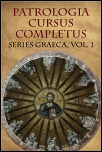
Authors include:
- Clement of Rome, Part 1
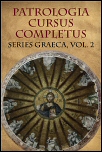
Authors include:
- Clement of Rome, Part 2
- S. Barnabas Apostolus
- S. Matthias Apostolus
- S. Bartholomaeus Apostolus
- Anacletus Papa
- Sanctus Hermas vir Apostolicus
- Presbyterorum et Diaconorum Achaiae
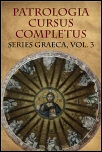
Authors include:
- Dionysius the Areopagite, Part 1
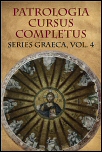
Authors include:
- Dionysius the Areopagite, Part 2
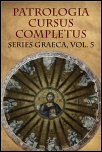
Authors include:
- Ignatius of Antioch, Polycarp
- Evaristus Papa
- Alexander I Papa
- Sixtus I Papa
- Telesphorus Papa
- Hyginus Papa
- Pius I Papa
- Anicetus I Papa
- Soter Papa
- Eleutherus Papa
- Melito of Sardis
- Papias
- Quadratus
- Aristides Apologista et Philosophus Christianus
- Agrippa Castor
- Aristo Pellaeus
- Claudius Apollinaris
- Episcopus Hierapolitan
- Apologista, Hegesippus
- Pantaenus, Rhodon
- Maximus Hierosolymorum
- Episcopus
- Polycrates Ephesiorum
- Theophilus Caesareae Palestinae Episcopus
- Serapion Episcopus Antiochenus
- Apollonius of Ephesus
- Anonymous 2nd-century writers
- S. Victor I, Papa
- Archaeus Episcopus Africanus
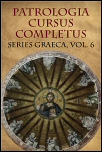
Authors include:
- Justin Martyr
- Tatian
- Athenagoras
- Theophilus of Antioch
- Hermias Philosophus
- Appendix Pars Prima, S. Justini Opera Spuria
- Appendicis Part II: Acti Martyrii S. Justini Complectens
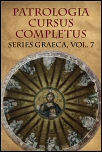
Authors include:
- Irenaeus
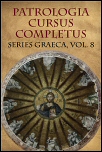
Authors include:
- Clement of Alexandria
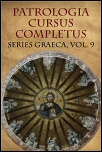
Authors include:
- Clement of Alexandria
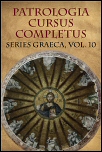
Authors include:
- S. Zephirinus Pontifex Romanus
- Caius Presbyter Romanus
- Julius Africanus
- S. Callistus I Pontifex Romanus et Martyr
- S. Urbanus I Pontifex Romanus
- Asterius Urbanus
- Pontianus Papa
- Anterus Papa
- S. Fabianus Papa
- S. Alexander Hierosolymitanus Episcopus et Martyr
- Sanctus Anatolius Alexandrinus Laodicensis in Syria Episcopus
- Theognostus Alexandrinus
- Pierius Catechista Alexandrius
- Malchio Ecclesiae Antiochenae Presbyter
- S. Hippolytus Porteunsis Episcopus Martyr et Ecclesiae Doctor
- S. Gregorius Neocaesariensis Episcopus Cognomento Thaumaturgis
- S. Dionysius Alexandrinus Episcopus, Macraius Magnes
- S. Archelaus Mesopotamiae Episcopus
- S. Pamphilus Ecclesiae Caesariensis Presbyter et Martyr
- S. Phileas Thmueos Episcopus et Martyr
- S. Theonas Episcopus Alexandrinus
- Addenda
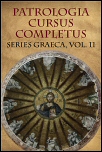
Authors include:
- Origen
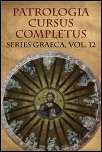
Authors include:
- Origen
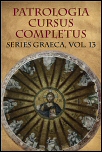
Authors include:
- Origen
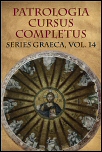
Authors include:
- Origen
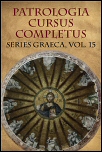
Authors include:
- Origen
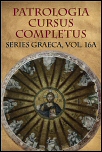
Authors include:
- Origen
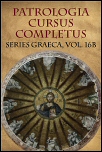
Authors include:
- Origen
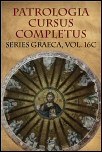
Authors include:
- Origen
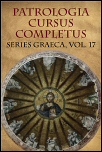
Authors include:
- Origen
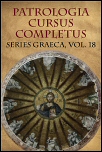
Authors include:
- Methodius of Olympius
- Alexander Lycopolitaus Episcopus
- S. Petrus Alexandrinus Episcopus et Martyr
- S. Alexander Episcopus Alexandrinus
- S. Eustathius Episcopus Antiochenus et Confessor
- Titus Bostrensis Episcopus
- Marcellus Ancyranus
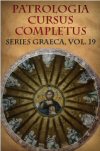
Patrologia Graeca, vol. 19
- Editor: Jacques Paul Migne
- Series: Patrologiae Cursus Completus: Series Graeca
Authors include:
- Eusebius of Caesarea
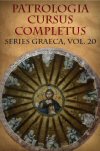
Patrologia Graeca, vol. 20
- Editor: Jacques Paul Migne
- Series: Patrologiae Cursus Completus: Series Graeca
Authors include:
- Eusebius of Caesarea
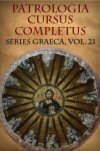
Patrologia Graeca, vol. 21
- Editor: Jacques Paul Migne
- Series: Patrologiae Cursus Completus: Series Graeca
Authors include:
- Eusebius of Caesarea
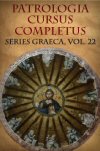
Patrologia Graeca, vol. 22
- Editor: Jacques Paul Migne
- Series: Patrologiae Cursus Completus: Series Graeca
Authors include:
- Eusebius of Caesarea
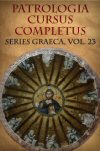
Patrologia Graeca, vol. 23
- Editor: Jacques Paul Migne
- Series: Patrologiae Cursus Completus: Series Graeca
Authors include:
- Eusebius of Caesarea
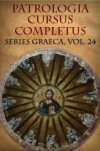
Patrologia Graeca, vol. 24
- Editor: Jacques Paul Migne
- Series: Patrologiae Cursus Completus: Series Graeca
Authors include:
- Eusebius of Caesarea
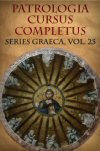
Patrologia Graeca, vol. 25
- Editor: Jacques Paul Migne
- Series: Patrologiae Cursus Completus: Series Graeca
Authors include:
- Athanasius
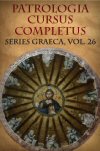
Patrologia Graeca, vol. 26
- Editor: Jacques Paul Migne
- Series: Patrologiae Cursus Completus: Series Graeca
Authors include:
- Athanasius
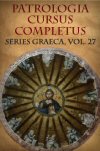
Patrologia Graeca, vol. 27
- Editor: Jacques Paul Migne
- Series: Patrologiae Cursus Completus: Series Graeca
Authors include:
- Athanasius
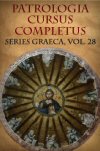
Patrologia Graeca, vol. 28
- Editor: Jacques Paul Migne
- Series: Patrologiae Cursus Completus: Series Graeca
Authors include:
- Athanasius
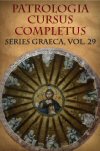
Patrologia Graeca, vol. 29
- Editor: Jacques Paul Migne
- Series: Patrologiae Cursus Completus: Series Graeca
Authors include:
- Basil the Great
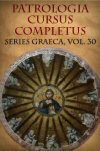
Patrologia Graeca, vol. 30
- Editor: Jacques Paul Migne
- Series: Patrologiae Cursus Completus: Series Graeca
Authors include:
- Basil the Great
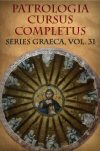
Patrologia Graeca, vol. 31
- Editor: Jacques Paul Migne
- Series: Patrologiae Cursus Completus: Series Graeca
Authors include:
- Basil the Great
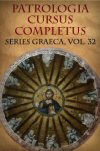
Patrologia Graeca, vol. 32
- Editor: Jacques Paul Migne
- Series: Patrologiae Cursus Completus: Series Graeca
Authors include:
- Basil the Great
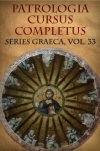
Patrologia Graeca, vol. 33
- Editor: Jacques Paul Migne
- Series: Patrologiae Cursus Completus: Series Graeca
Authors include:
- Cyril of Jerusalem
- Apollinaris of Laodicea
- Diodorus of Tarsus
- and more
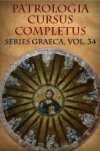
Patrologia Graeca, vol. 34
- Editor: Jacques Paul Migne
- Series: Patrologiae Cursus Completus: Series Graeca
Authors include:
- Macarius of Egypt
- Macarius of Alexandria
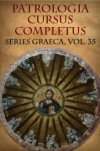
Patrologia Graeca, vol. 35
- Editor: Jacques Paul Migne
- Series: Patrologiae Cursus Completus: Series Graeca
Authors include:
- Gregory of Nazianzus
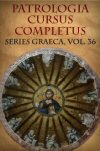
Patrologia Graeca, vol. 36
- Editor: Jacques Paul Migne
- Series: Patrologiae Cursus Completus: Series Graeca
Authors include:
- Gregory of Nazianzus
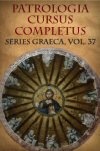
Patrologia Graeca, vol. 37
- Editor: Jacques Paul Migne
- Series: Patrologiae Cursus Completus: Series Graeca
Authors include:
- Gregory of Nazianzus
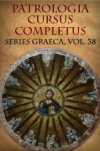
Patrologia Graeca, vol. 38
- Editor: Jacques Paul Migne
- Series: Patrologiae Cursus Completus: Series Graeca
Authors include:
- Gregory of Nazianzus
- Caesarius
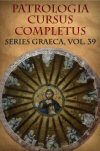
Patrologia Graeca, vol. 39
- Editor: Jacques Paul Migne
- Series: Patrologiae Cursus Completus: Series Graeca
Authors include:
- Didymus the Blind
- Amphilochius Iconiensis
- Nectarius
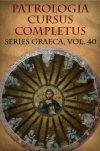
Patrologia Graeca, vol. 40
- Editor: Jacques Paul Migne
- Series: Patrologiae Cursus Completus: Series Graeca
Authors include:
- Anthony the Great
- Pachomius
- Serapion
- and more
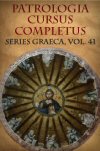
Patrologia Graeca, vol. 41
- Editor: Jacques Paul Migne
- Series: Patrologiae Cursus Completus: Series Graeca
Authors include:
- Epiphanius
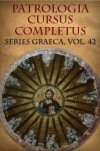
Patrologia Graeca, vol. 42
- Editor: Jacques Paul Migne
- Series: Patrologiae Cursus Completus: Series Graeca
Authors include:
- Epiphanius
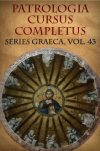
Patrologia Graeca, vol. 43
- Editor: Jacques Paul Migne
- Series: Patrologiae Cursus Completus: Series Graeca
Authors include:
- Epiphanius
- Nonnus of Panopolitanus
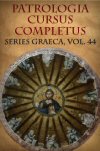
Patrologia Graeca, vol. 44
- Editor: Jacques Paul Migne
- Series: Patrologiae Cursus Completus: Series Graeca
Authors include:
- Gregory of Nyssa
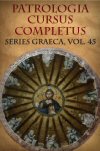
Patrologia Graeca, vol. 45
- Editor: Jacques Paul Migne
- Series: Patrologiae Cursus Completus: Series Graeca
Authors include:
- Gregory of Nyssa
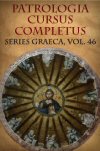
Patrologia Graeca, vol. 46
- Editor: Jacques Paul Migne
- Series: Patrologiae Cursus Completus: Series Graeca
Authors include:
- Gregory of Nyssa
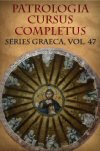
Patrologia Graeca, vol. 47
- Editor: Jacques Paul Migne
- Series: Patrologiae Cursus Completus: Series Graeca
Authors include:
- John Chrysostom
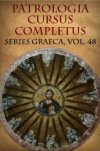
Patrologia Graeca, vol. 48
- Editor: Jacques Paul Migne
- Series: Patrologiae Cursus Completus: Series Graeca
Authors include:
- John Chrysostom
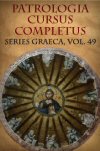
Patrologia Graeca, vol. 49
- Editor: Jacques Paul Migne
- Series: Patrologiae Cursus Completus: Series Graeca
Authors include:
- John Chrysostom
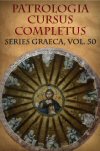
Patrologia Graeca, vol. 50
- Editor: Jacques Paul Migne
- Series: Patrologiae Cursus Completus: Series Graeca
Authors include:
- John Chrysostom
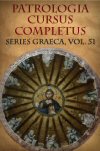
Patrologia Graeca, vol. 51
- Editor: Jacques Paul Migne
- Series: Patrologiae Cursus Completus: Series Graeca
Authors include:
- John Chrysostom
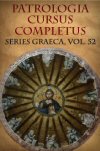
Patrologia Graeca, vol. 52
- Editor: Jacques Paul Migne
- Series: Patrologiae Cursus Completus: Series Graeca
Authors include:
- John Chrysostom
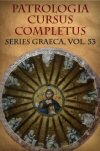
Patrologia Graeca, vol. 53
- Editor: Jacques Paul Migne
- Series: Patrologiae Cursus Completus: Series Graeca
Authors include:
- John Chrysostom
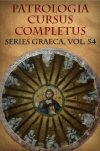
Patrologia Graeca, vol. 54
- Editor: Jacques Paul Migne
- Series: Patrologiae Cursus Completus: Series Graeca
Authors include:
- John Chrysostom
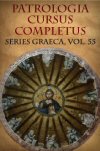
Patrologia Graeca, vol. 55
- Editor: Jacques Paul Migne
- Series: Patrologiae Cursus Completus: Series Graeca
Authors include:
- John Chrysostom
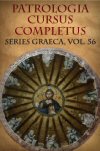
Patrologia Graeca, vol. 56
- Editor: Jacques Paul Migne
- Series: Patrologiae Cursus Completus: Series Graeca
Authors include:
- John Chrysostom
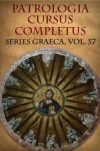
Patrologia Graeca, vol. 57
- Editor: Jacques Paul Migne
- Series: Patrologiae Cursus Completus: Series Graeca
Authors include:
- John Chrysostom
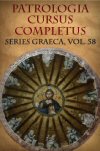
Patrologia Graeca, vol. 58
- Editor: Jacques Paul Migne
- Series: Patrologiae Cursus Completus: Series Graeca
Authors include:
- John Chrysostom
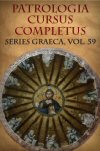
Patrologia Graeca, vol. 59
- Editor: Jacques Paul Migne
- Series: Patrologiae Cursus Completus: Series Graeca
Authors include:
- John Chrysostom
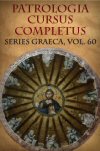
Patrologia Graeca, vol. 60
- Editor: Jacques Paul Migne
- Series: Patrologiae Cursus Completus: Series Graeca
Authors include:
- John Chrysostom
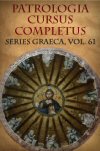
Patrologia Graeca, vol. 61
- Editor: Jacques Paul Migne
- Series: Patrologiae Cursus Completus: Series Graeca
Authors include:
- John Chrysostom
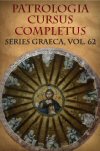
Patrologia Graeca, vol. 62
- Editor: Jacques Paul Migne
- Series: Patrologiae Cursus Completus: Series Graeca
Authors include:
- John Chrysostom
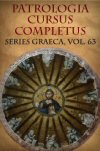
Patrologia Graeca, vol. 63
- Editor: Jacques Paul Migne
- Series: Patrologiae Cursus Completus: Series Graeca
Authors include:
- John Chrysostom
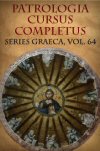
Patrologia Graeca, vol. 64
- Editor: Jacques Paul Migne
- Series: Patrologiae Cursus Completus: Series Graeca
Authors include:
- John Chrysostom
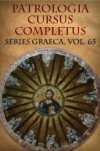
Patrologia Graeca, vol. 65
- Editor: Jacques Paul Migne
- Series: Patrologiae Cursus Completus: Series Graeca
Authors include:
- Severianus
- Theophilus
- Palladius
- Philostrogius
- Atticus
- Proclus
- Flavianus
- Marcus Eremita
- Marcus Diadochus
- Marcus Diaconus
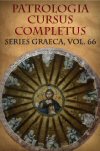
Patrologia Graeca, vol. 66
- Editor: Jacques Paul Migne
- Series: Patrologiae Cursus Completus: Series Graeca
Authors include:
- Theodore of Mopsuestia
- Synesius
- Arsenius
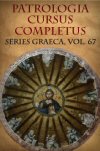
Patrologia Graeca, vol. 67
- Editor: Jacques Paul Migne
- Series: Patrologiae Cursus Completus: Series Graeca
Authors include:
- Socrates
- Sozomenus
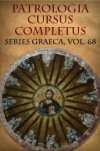
Patrologia Graeca, vol. 68
- Editor: Jacques Paul Migne
- Series: Patrologiae Cursus Completus: Series Graeca
Authors include:
- Cyril of Alexandria
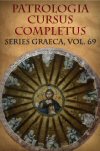
Patrologia Graeca, vol. 69
- Editor: Jacques Paul Migne
- Series: Patrologiae Cursus Completus: Series Graeca
Authors include:
- Cyril of Alexandria
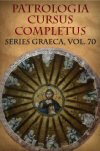
Patrologia Graeca, vol. 70
- Editor: Jacques Paul Migne
- Series: Patrologiae Cursus Completus: Series Graeca
Authors include:
- Cyril of Alexandria
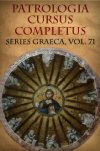
Patrologia Graeca, vol. 71
- Editor: Jacques Paul Migne
- Series: Patrologiae Cursus Completus: Series Graeca
Authors include:
- Cyril of Alexandria
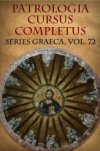
Patrologia Graeca, vol. 72
- Editor: Jacques Paul Migne
- Series: Patrologiae Cursus Completus: Series Graeca
Authors include:
- Cyril of Alexandria
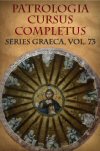
Patrologia Graeca, vol. 73
- Editor: Jacques Paul Migne
- Series: Patrologiae Cursus Completus: Series Graeca
Authors include:
- Cyril of Alexandria
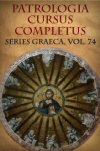
Patrologia Graeca, vol. 74
- Editor: Jacques Paul Migne
- Series: Patrologiae Cursus Completus: Series Graeca
Authors include:
- Cyril of Alexandria
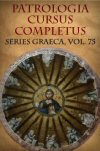
Patrologia Graeca, vol. 75
- Editor: Jacques Paul Migne
- Series: Patrologiae Cursus Completus: Series Graeca
Authors include:
- Cyril of Alexandria
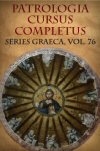
Patrologia Graeca, vol. 76
- Editor: Jacques Paul Migne
- Series: Patrologiae Cursus Completus: Series Graeca
Authors include:
- Cyril of Alexandria
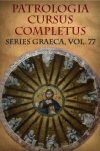
Patrologia Graeca, vol. 77
- Editor: Jacques Paul Migne
- Series: Patrologiae Cursus Completus: Series Graeca
Authors include:
- Cyril of Alexandria
- Theodotus of Ancyranus
- Paul of Emesenus
- Acacius of Berrhœensis
- John of Antioch
- Memon of Ephesus
- Acacus of Melito
- Rabbulus of Edesse
- Firmus of Cæsaria
- Amphilochius of Sidon
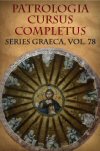
Patrologia Graeca, vol. 78
- Editor: Jacques Paul Migne
- Series: Patrologiae Cursus Completus: Series Graeca
Authors include:
- Isidorus Pelusiotæ
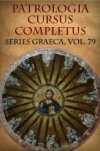
Patrologia Graeca, vol. 79
- Editor: Jacques Paul Migne
- Series: Patrologiae Cursus Completus: Series Graeca
Authors include:
- Nilus of Sinai
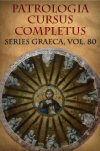
Patrologia Graeca, vol. 80
- Editor: Jacques Paul Migne
- Series: Patrologiae Cursus Completus: Series Graeca
Authors include:
- Theodoretus of Cyrrhus (Cyrus)
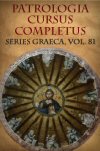
Patrologia Graeca, vol. 81
- Editor: Jacques Paul Migne
- Series: Patrologiae Cursus Completus: Series Graeca
Authors include:
- Theodoretus of Cyrrhus (Cyrus)
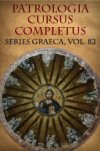
Patrologia Graeca, vol. 82
- Editor: Jacques Paul Migne
- Series: Patrologiae Cursus Completus: Series Graeca
Authors include:
- Theodoretus of Cyrrhus (Cyrus)
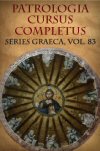
Patrologia Graeca, vol. 83
- Editor: Jacques Paul Migne
- Series: Patrologiae Cursus Completus: Series Graeca
Authors include:
- Theodoretus of Cyrrhus (Cyrus)
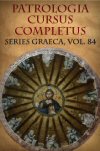
Patrologia Graeca, vol. 84
- Editor: Jacques Paul Migne
- Series: Patrologiae Cursus Completus: Series Graeca
Authors include:
- Theodoretus of Cyrrhus (Cyrus)
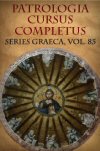
Patrologia Graeca, vol. 85
- Editor: Jacques Paul Migne
- Series: Patrologiae Cursus Completus: Series Graeca
Authors include:
- Basil of Seleucia
- Euthalius Deacon of Alexandria
- John of Carpathios
- Aeneas Gazæos
- Zacharias Mitylenes Gelasius of Cyzicus
- Theotimus
- Ammonius
- Andreas of Samosatus
- Gennadius of Constantinople
- Candidus
- Antipater of Bostros
- Dalmatius
- Timothy
- Eustathius
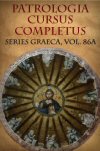
Patrologia Graeca, vol. 86a
- Editor: Jacques Paul Migne
- Series: Patrologiae Cursus Completus: Series Graeca
Authors include:
- Timothy of Constantinople
- Theodorus
- Procopius Deacon of Tyre
- Theodorus Bishop of Scythopolitanus
- Timothy of Hierosolymitanus
- Timothy III of Alexandria
- Theodosius of Alexandria
- Eusebius of Alexandria
- Eusebius of Emesenus
- Gregentius of Tapharensis
- Epiphanius of Contstantinople
- Isaac of Ninivitanus
- Barsanuphius of Palestine
- Eustathius
- Justinian
- Agapetus
- Leontius Byzantinus
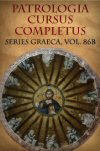
Patrologia Graeca, vol. 86b
- Editor: Jacques Paul Migne
- Series: Patrologiae Cursus Completus: Series Graeca
Authors include:
- Leontius Byzantinus
- Ephraimus of Antioch
- Paulus Silentiarus
- Eutrychius of Constantinople
- Evagrius the scholar
- Eulogius of Alexandria
- Simeon Stylita Junior
- Zacharias of Heirosolymitanus
- Modesta of Hierosolymitanus
- Jobius
- Erechtius of Antioch
- Peter of Laodocia
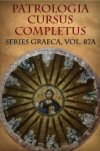
Patrologia Graeca, vol. 87a
- Editor: Jacques Paul Migne
- Series: Patrologiae Cursus Completus: Series Graeca
Authors include:
- Procopius of Gaza
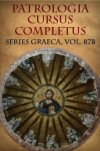
Patrologia Graeca, vol. 87b
- Editor: Jacques Paul Migne
- Series: Patrologiae Cursus Completus: Series Graeca
Authors include:
- Procopius of Gaza
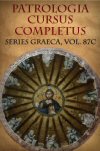
Patrologia Graeca, vol. 87c
- Editor: Jacques Paul Migne
- Series: Patrologiae Cursus Completus: Series Graeca
Authors include:
- Procopius of Gaza
- Joannes Moschus
- Sophronius
- Alexander Monachus
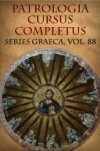
Patrologia Graeca, vol. 88
- Editor: Jacques Paul Migne
- Series: Patrologiae Cursus Completus: Series Graeca
Authors include:
- Cosmas Indicopleustes
- Constantine the Deacon
- Joannes Climacus
- Agathias Myrinæ
- Gregory of Antioch
- Joannes Jejunator the Partriarch of Constantinople
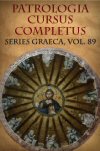
Patrologia Graeca, vol. 89
- Editor: Jacques Paul Migne
- Series: Patrologiae Cursus Completus: Series Graeca
Authors include:
- Anastasius of Sinai
- Anastasius of Antioch
- Anastisius Abbot of Euthymius
- Anastasius IV Patriarch of Antioch
- Antiochus of Sabe
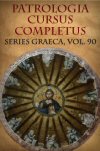
Patrologia Graeca, vol. 90
- Editor: Jacques Paul Migne
- Series: Patrologiae Cursus Completus: Series Graeca
Authors include:
- Maximus the Abbot
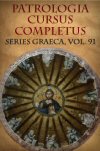
Patrologia Graeca, vol. 91
- Editor: Jacques Paul Migne
- Series: Patrologiae Cursus Completus: Series Graeca
Authors include:
- Maximus the Confessor
- Thalasius the Abbot
- Theodore the Abbot of Raithuensis
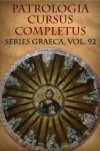
Patrologia Graeca, vol. 92
- Editor: Jacques Paul Migne
- Series: Patrologiae Cursus Completus: Series Graeca
Authors include:
- Paschal Chronicle
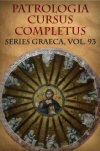
Patrologia Graeca, vol. 93
- Editor: Jacques Paul Migne
- Series: Patrologiae Cursus Completus: Series Graeca
Authors include:
- Olympiodus Deacon of Alexandria
- Hesychius
- Leontius of Neapoleos in Cyprus
- Leontius of Damascus
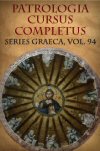
Patrologia Graeca, vol. 94
- Editor: Jacques Paul Migne
- Series: Patrologiae Cursus Completus: Series Graeca
Authors include:
- John of Damascus
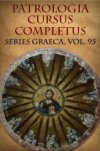
Patrologia Graeca, vol. 95
- Editor: Jacques Paul Migne
- Series: Patrologiae Cursus Completus: Series Graeca
Authors include:
- John of Damascus
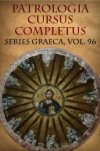
Patrologia Graeca, vol. 96
- Editor: Jacques Paul Migne
- Series: Patrologiae Cursus Completus: Series Graeca
Authors include:
- John of Damascus
- John of Nicæa
- John the Patriarch of Constantinople
- Joannes Eubœensis
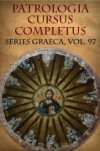
Patrologia Graeca, vol. 97
- Editor: Jacques Paul Migne
- Series: Patrologiae Cursus Completus: Series Graeca
Authors include:
- John Malalas
- Andreas of Jerusalem
- Elias of Crete
- Theordore Abucara
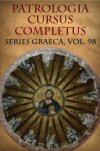
Patrologia Graeca, vol. 98
- Editor: Jacques Paul Migne
- Series: Patrologiae Cursus Completus: Series Graeca
Authors include:
- Germanus Patriach of Constantinople
- Cosmas of Jerusalem
- Gregory II
- Anonymus Becuccianus
- Pantaleon Deacon of Constantinople
- Adrian the Monk
- Epiphanius Deacon of Catania
- Pacomius the Monk
- Philotheus the Monk
- Tarasius Patriarch of Constantinople
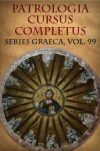
Patrologia Graeca, vol. 99
- Editor: Jacques Paul Migne
- Series: Patrologiae Cursus Completus: Series Graeca
Authors include:
- Theodori Studitæ
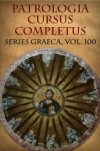
Patrologia Graeca, vol. 100
- Editor: Jacques Paul Migne
- Series: Patrologiae Cursus Completus: Series Graeca
Authors include:
- Nicephorus Patriarch of Constantinople
- Stephen Deacon of Constantinople
- Gregorius Decapolita
- Christopher Patriarch of Alexandria
- Methodius Patriarch of Constantinople
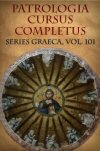
Patrologia Graeca, vol. 101
- Editor: Jacques Paul Migne
- Series: Patrologiae Cursus Completus: Series Graeca
Authors include:
- Photius of Constantinople
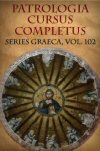
Patrologia Graeca, vol. 102
- Editor: Jacques Paul Migne
- Series: Patrologiae Cursus Completus: Series Graeca
Authors include:
- Photius of Constantinople
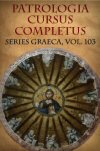
Patrologia Graeca, vol. 103
- Editor: Jacques Paul Migne
- Series: Patrologiae Cursus Completus: Series Graeca
Authors include:
- Photius of Constantinople
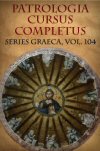
Patrologia Graeca, vol. 104
- Editor: Jacques Paul Migne
- Series: Patrologiae Cursus Completus: Series Graeca
Authors include:
- Photius of Constantinople
- Petrus Siculus
- Peter bishop of Argos
- Bartholomew of Edessa
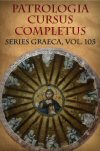
Patrologia Graeca, vol. 105
- Editor: Jacques Paul Migne
- Series: Patrologiae Cursus Completus: Series Graeca
Authors include:
- Nicetas David Paphlago
- Nicetas of Byzantium
- Theognostus the Monk
- Josephus the Hymnographer
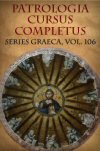
Patrologia Graeca, vol. 106
- Editor: Jacques Paul Migne
- Series: Patrologiae Cursus Completus: Series Graeca
Authors include:
- Joseppus
- Nicephorus the Philosopher
- Andreas archbishop of Cæsarea in Capadoccia
- Arethas Bishop of Cæsarea in Cappadocia
- Joannes Geometra
- Cosmas Vestitor
- Leo Patricius
- Athanasius Bishop of Corinth
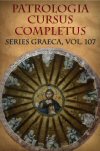
Patrologia Graeca, vol. 107
- Editor: Jacques Paul Migne
- Series: Patrologiae Cursus Completus: Series Graeca
Authors include:
- Leo VI Roman Emperor
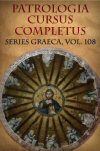
Patrologia Graeca, vol. 108
- Editor: Jacques Paul Migne
- Series: Patrologiae Cursus Completus: Series Graeca
Authors include:
- Theophanes Abbot
- Confessor
- Unknown Author
- Leo Grammaticus
- Anastasii History and Church Librarian
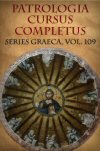
Patrologia Graeca, vol. 109
- Editor: Jacques Paul Migne
- Series: Patrologiae Cursus Completus: Series Graeca
Authors include:
- Scriptores post Theophanem ex edit. Fr. Combefisii
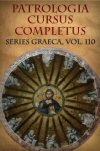
Patrologia Graeca, vol. 110
- Editor: Jacques Paul Migne
- Series: Patrologiae Cursus Completus: Series Graeca
Authors include:
- Georgius Monachus
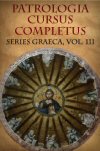
Patrologia Graeca, vol. 111
- Editor: Jacques Paul Migne
- Series: Patrologiae Cursus Completus: Series Graeca
Authors include:
- Nicholas Patriarch of Constantinople
- Basilius Neopatrensis Metropolita
- Basil Bishop of Cæsaræ Cappadocia
- Gregory Presbyter of Cæsareæ
- Josephus Genesius
- Moses son of Cepha in Syria
- Theodorus Daphnopata
- Nicephorus Presbyter of Constantinople
- Eutychius Patriarch of Alexandria
- George the Monk
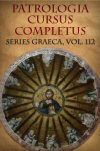
Patrologia Graeca, vol. 112
- Editor: Jacques Paul Migne
- Series: Patrologiae Cursus Completus: Series Graeca
Authors include:
- Constantine Porphyrogenitus
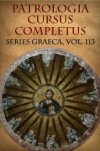
Patrologia Graeca, vol. 113
- Editor: Jacques Paul Migne
- Series: Patrologiae Cursus Completus: Series Graeca
Authors include:
- Constantine Porphyrogenitus
- Nicon the Monk in Crete
- Theodosius the Deacon
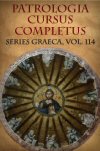
Patrologia Graeca, vol. 114
- Editor: Jacques Paul Migne
- Series: Patrologiae Cursus Completus: Series Graeca
Authors include:
- Symeon Metaphrastes
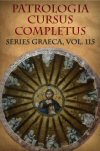
Patrologia Graeca, vol. 115
- Editor: Jacques Paul Migne
- Series: Patrologiae Cursus Completus: Series Graeca
Authors include:
- Symeon Metaphrastes
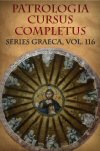
Patrologia Graeca, vol. 116
- Editor: Jacques Paul Migne
- Series: Patrologiae Cursus Completus: Series Graeca
Authors include:
- Symeon Metaphrastes
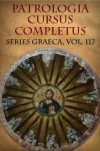
Patrologia Graeca, vol. 117
- Editor: Jacques Paul Migne
- Series: Patrologiae Cursus Completus: Series Graeca
Authors include:
- Leonis Diaconi with Hyppolitus Thebanus
- Georgides Monachus
- Ignatius Diaconus
- Nilus
- Christophus Protoasecretis
- Michael Hamartolus
- Suidas
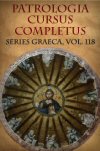
Patrologia Graeca, vol. 118
- Editor: Jacques Paul Migne
- Series: Patrologiae Cursus Completus: Series Graeca
Authors include:
- Œcumenius Bishop of Trikka
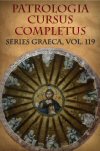
Patrologia Graeca, vol. 119
- Editor: Jacques Paul Migne
- Series: Patrologiae Cursus Completus: Series Graeca
Authors include:
- Œcumenius Bishop of Trikka
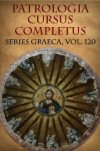
Patrologia Graeca, vol. 120
- Editor: Jacques Paul Migne
- Series: Patrologiae Cursus Completus: Series Graeca
Authors include:
- Theodorus Iconii Episcopus
- Leo Presbyter
- Leo Grammaticus
- Joannis Presbyter
- Epiphanius Monachus Hierosolymitanus
- Alexius Patriarch of Constantinople
- Demetrius Syncellus Cyzicenus Metropolita
- Nicetas Chartophylax Nicænus
- Michael Cerularius Patriarch of Constantinople
- Samonas Gaxensis Episcopus
- Leo Achridanus Bulgarorum Archiepiscopus
- Nicetas Pectoratus Presbyter et Monasterii Studiensis Monachus
- Joannes Euchaitarum MetropolitaJoannis Xiphilini Archbishop of Constantinople
- Joannes Deacon of Constantinople
- Symeonis Junioris
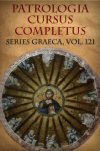
Patrologia Graeca, vol. 121
- Editor: Jacques Paul Migne
- Series: Patrologiae Cursus Completus: Series Graeca
Authors include:
- Georgii Cedreni
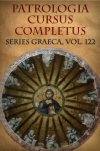
Patrologia Graeca, vol. 122
- Editor: Jacques Paul Migne
- Series: Patrologiae Cursus Completus: Series Graeca
Authors include:
- Georgii Cedreni
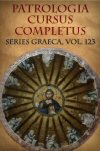
Patrologia Graeca, vol. 123
- Editor: Jacques Paul Migne
- Series: Patrologiae Cursus Completus: Series Graeca
Authors include:
- Theophylactus Bulgariæ Archiepiscopus
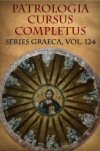
Patrologia Graeca, vol. 124
- Editor: Jacques Paul Migne
- Series: Patrologiae Cursus Completus: Series Graeca
Authors include:
- Theophylactus Bulgariæ Archiepiscopus
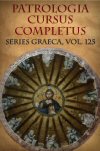
Patrologia Graeca, vol. 125
- Editor: Jacques Paul Migne
- Series: Patrologiae Cursus Completus: Series Graeca
Authors include:
- Theophylactus Bulgariæ Archiepiscopus
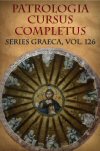
Patrologia Graeca, vol. 126
- Editor: Jacques Paul Migne
- Series: Patrologiae Cursus Completus: Series Graeca
Authors include:
- Theophylactus Bulgariæ Archiepiscopus
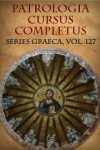
Patrologia Graeca, vol. 127
- Editor: Jacques Paul Migne
- Series: Patrologiae Cursus Completus: Series Graeca
Authors include:
- Nicephorus Bryennius
- Constantinus Manasses
- Nicolaus Patriarch of Constantinople
- Lucas Abbas Cryptoferrantersis Septimus
- Nicon Monachus Raithensis in Palestina
- Anastasius Cæsareæ Palæstineæ Archiepiscopus
- Nicetas Serronius
- Jacobus Monachus Coccinobaphi
- Philippus Solitarius
- Job Monachus
- Petrus Chrysolanus Mediolanensis Archiepiscopus
- Alexius Comnenus Imp. Irene Augusta
- Nicephorus Botaniata Imp.
- Nicetas Seidus
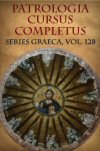
Patrologia Graeca, vol. 128
- Editor: Jacques Paul Migne
- Series: Patrologiae Cursus Completus: Series Graeca
Authors include:
- Euthymius Zigabeno
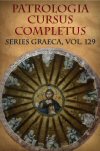
Patrologia Graeca, vol. 129
- Editor: Jacques Paul Migne
- Series: Patrologiae Cursus Completus: Series Graeca
Authors include:
- Euthymius Zigabeno
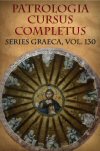
Patrologia Graeca, vol. 130
- Editor: Jacques Paul Migne
- Series: Patrologiae Cursus Completus: Series Graeca
Authors include:
- Euthymius Zigabeno
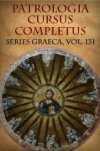
Patrologia Graeca, vol. 131
- Editor: Jacques Paul Migne
- Series: Patrologiae Cursus Completus: Series Graeca
Authors include:
- Euthymius Zigabeno
- Anna Comenea Porphyrogenit Cæsarissa
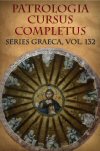
Patrologia Graeca, vol. 132
- Editor: Jacques Paul Migne
- Series: Patrologiae Cursus Completus: Series Graeca
Authors include:
- Theophanes Kerameus
- Nilus Doxapatrius
- John Bishop of Antioch
- Joannes Comnenus
- Isaacus Magnæ Armeniæ Catholicus
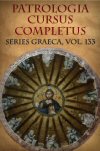
Patrologia Graeca, vol. 133
- Editor: Jacques Paul Migne
- Series: Patrologiae Cursus Completus: Series Graeca
Authors include:
- Arsenius in Monte Sancto Monachus
- Aristenus Monachus
- Lucas Chrysoberges
- Theorianus Philosophus Christianus
- Nerses Claiensis
- Joannes Cinnamus
- Manuel Comnenus
- Alexius Comnenus
- Andronicus Comnenus
- Theodorus Prodromus
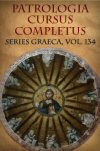
Patrologia Graeca, vol. 134
- Editor: Jacques Paul Migne
- Series: Patrologiae Cursus Completus: Series Graeca
Authors include:
- Joannis Zonaræ
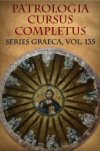
Patrologia Graeca, vol. 135
- Editor: Jacques Paul Migne
- Series: Patrologiae Cursus Completus: Series Graeca
Authors include:
- Joannis Zonaræ
- Georgius Xiphilinus
- Isaacius Angleus
- Neophytus
- Joannes Chilas
- Nicolaus Methonensis in Peloponneso Metropolita
- Eustathius Thessalonicensis Metropolita
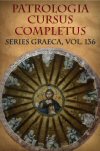
Patrologia Graeca, vol. 136
- Editor: Jacques Paul Migne
- Series: Patrologiae Cursus Completus: Series Graeca
Authors include:
- Eustathius of Thessalonica
- Antonius Melissa
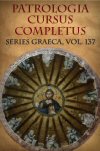
Patrologia Graeca, vol. 137
- Editor: Jacques Paul Migne
- Series: Patrologiae Cursus Completus: Series Graeca
Authors include:
- Theodori Balsamonis
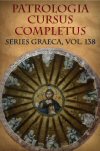
Patrologia Graeca, vol. 138
- Editor: Jacques Paul Migne
- Series: Patrologiae Cursus Completus: Series Graeca
Authors include:
- Theodori Balsamonis
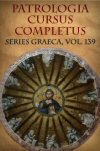
Patrologia Graeca, vol. 139
- Editor: Jacques Paul Migne
- Series: Patrologiae Cursus Completus: Series Graeca
Authors include:
- Isidorus Thessalonicensis Metropolita
- Nicetas Maroneæ Thessalonicensis Metropolita
- Joannes Citri Episcopus
- Marcus Alexandrinus Byzantinus
- Nicetas Choniata
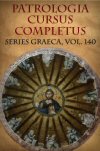
Patrologia Graeca, vol. 140
- Editor: Jacques Paul Migne
- Series: Patrologiae Cursus Completus: Series Graeca
Authors include:
- Nicetas Choniata
- Michael Acominatus Choniata Archbishop of Athens
- Theodorus Alanicus
- Theordous Andidensis Episcopus
- Manuel Magnus Rhetor Constantinople
- Pantaleo, Manuel Charitopulus
- Germanus II
- Michael Chumnus
- Theodorus Ducas Lascaris
- Methodius
- Nicephorus II
- Constantinus Acropolita
- Arsenius Autorianus
- Georgius Acropolita
- Nicephorus Chumnus
- Alexander IV
- Sixtus IV
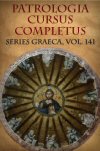
Patrologia Graeca, vol. 141
- Editor: Jacques Paul Migne
- Series: Patrologiae Cursus Completus: Series Graeca
Authors include:
- Joannes Veccus
- Constantinus Meliteniota
- Georgius Metochita
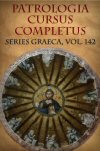
Patrologia Graeca, vol. 142
- Editor: Jacques Paul Migne
- Series: Patrologiae Cursus Completus: Series Graeca
Authors include:
- Georgius Cyprius
- Athanasius Patriarch of Constantinople
- Nicephorus Blemmida
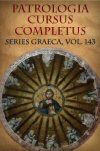
Patrologia Graeca, vol. 143
- Editor: Jacques Paul Migne
- Series: Patrologiae Cursus Completus: Series Graeca
Authors include:
- Ephræmius Chronographus
- Theoleptus Philadelphiensium Metropolita
- Georgius Pachymeres
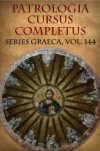
Patrologia Graeca, vol. 144
- Editor: Jacques Paul Migne
- Series: Patrologiae Cursus Completus: Series Graeca
Authors include:
- Georgius Pachymeres
- Theodorus Metochita Magnus Logtheta
- Matthæus Blastares Hieromonachus
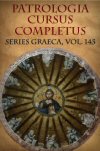
Patrologia Graeca, vol. 145
- Editor: Jacques Paul Migne
- Series: Patrologiae Cursus Completus: Series Graeca
Authors include:
- Matthæus Blastares Hieromonachus
- Theodulus Monachus
- Alias Thomas Magister
- Nicephorus Callistus Xanthopulus
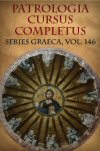
Patrologia Graeca, vol. 146
- Editor: Jacques Paul Migne
- Series: Patrologiae Cursus Completus: Series Graeca
Authors include:
- Nicephorus Callistus Xanthopulus
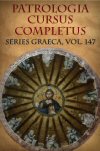
Patrologia Graeca, vol. 147
- Editor: Jacques Paul Migne
- Series: Patrologiae Cursus Completus: Series Graeca
Authors include:
- Nicephorus Callistus Xanthopulus
- Callistus et Ignatius Xanthopuli Monachi
- Callistus Patriarcha Constantinopuli Monachi
- Callistus Telicoudes
- Callistus Cataphugiota
- Nicepphorus Monachus
- Maximus Planudes Cpolitanus Monachus
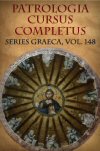
Patrologia Graeca, vol. 148
- Editor: Jacques Paul Migne
- Series: Patrologiae Cursus Completus: Series Graeca
Authors include:
- Nicephorus Gregoras
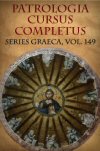
Patrologia Graeca, vol. 149
- Editor: Jacques Paul Migne
- Series: Patrologiae Cursus Completus: Series Graeca
Authors include:
- Nicephorus Gregoras
- Nilus Cabasilas Thessalonicensis Metropolita
- Theodorus Meliteniota
- Magnæ Ecclesiæ Sacellarius
- Georgius Lapitha
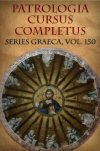
Patrologia Graeca, vol. 150
- Editor: Jacques Paul Migne
- Series: Patrologiae Cursus Completus: Series Graeca
Authors include:
- Constantinus Harmenopulus
- Macarius Chrysocephalus Philadelphiensis Metropolita
- Joannes Caleca Cpolitanus Patriarcha
- Theophanes Nicænus Archiepiscopus
- Nicolaus Cabasila Thessalonicensis Metropolita
- Gregorius Palamas Thessalonicensis Metropolita
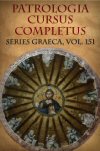
Patrologia Graeca, vol. 151
- Editor: Jacques Paul Migne
- Series: Patrologiae Cursus Completus: Series Graeca
Authors include:
- Gregorius Palamas Thessalonicensis Metropolita
- Gregorius Acindynus Monachus et Theologus
- Barlaamus de Seminaria
- Gyracensis Episcopus
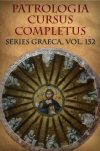
Patrologia Graeca, vol. 152
- Editor: Jacques Paul Migne
- Series: Patrologiae Cursus Completus: Series Graeca
Authors include:
- Manuel Calecas Ordinis fratrum minorum Monachus Cpolitanus Patriarcha
- Joannes Cyparissiota
- Matthæus Cantacuzenus Imp.Cp. and Joan. Glycis
- Esaias
- Joan. Caleca
- Isidorus
- Callistus
- Philotheus Cpolitani
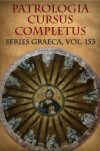
Patrologia Graeca, vol. 153
- Editor: Jacques Paul Migne
- Series: Patrologiae Cursus Completus: Series Graeca
Authors include:
- Joannes Cantacuzenus Imp. CP
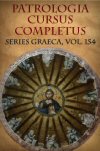
Patrologia Graeca, vol. 154
- Editor: Jacques Paul Migne
- Series: Patrologiae Cursus Completus: Series Graeca
Authors include:
- Joannes Cantacuzenus Imp. CP
- Philotheus Cpolitanus Patriarcha
- Demetrius Cydonius
- Maximus Chrysoberga Monachus
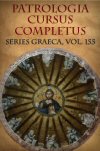
Patrologia Graeca, vol. 155
- Editor: Jacques Paul Migne
- Series: Patrologiae Cursus Completus: Series Graeca
Authors include:
- Symeon Thessalonicensis Archiepiscopus
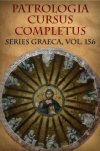
Patrologia Graeca, vol. 156
- Editor: Jacques Paul Migne
- Series: Patrologiae Cursus Completus: Series Graeca
Authors include:
- Manuel Chrysoloras
- Joannes Cananus
- Manuel II Palæologus
- Joannes Anagnosta
- Georgius Phrantza
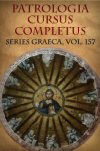
Patrologia Graeca, vol. 157
- Editor: Jacques Paul Migne
- Series: Patrologiae Cursus Completus: Series Graeca
Authors include:
- Georgius Codinus Curopalata
- Ducas
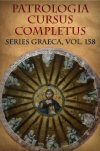
Patrologia Graeca, vol. 158
- Editor: Jacques Paul Migne
- Series: Patrologiae Cursus Completus: Series Graeca
Authors include:
- Michael Clyca
- Joannes Diaconus Adrianopolitanus
- Esaias Cyprius
- Hilario Monachus
- Joannes Argyropulus
- Josephus Cpolitanus Patriarcha
- Job Monachus
- Bartholomæus de Jano Ord. Minorum
- Nicolaus Barbarus Patricius Venetus
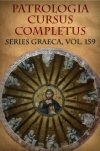
Patrologia Graeca, vol. 159
- Editor: Jacques Paul Migne
- Series: Patrologiae Cursus Completus: Series Graeca
Authors include:
- Laonicus Chalcocondyla Atheniensis
- Leonardus Chiensis Mitlyenæus Archiepiscopus
- Isidorus S.R.E. Cardinalis Ruthenorum Episcopus
- Josephus Methonensis Episcopus
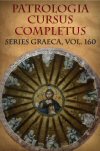
Patrologia Graeca, vol. 160
- Editor: Jacques Paul Migne
- Series: Patrologiae Cursus Completus: Series Graeca
Authors include:
- Gregorius Mamma Cpolitanus Patriarcha
- Gennadius Seu Georgius Scholarius Xpolitanus Patriarcha
- Georgius Gemistus Pletho
- Matthæus Camariota
- Marcus Eugenicus Ephesius Metropolita
- Nicolaus V Romanus Pontifex
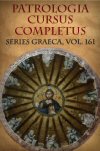
Patrologia Graeca, vol. 161
- Editor: Jacques Paul Migne
- Series: Patrologiae Cursus Completus: Series Graeca
Authors include:
- Bessarion S.R.E. Cardinalis
- Georgius Trapezuntinus
- Constantinus Lascaris
- Theodorus Gaza
- Andronicus Callistus
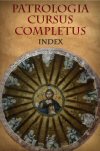
Patrologia Graeca Index
- Editor: Jacques Paul Migne
- Series: Patrologiae Cursus Completus: Series Graeca
Includes:
- Indices
Jacques Paul Migne (1800–1875) was a notable priest and publisher in nineteenth-century France. He studied theology at Orleans, before becoming ordained in the diocese of Orleans in 1824. After publishing a controversial pamphlet, Migne was forced to leave his parish. He moved to Paris, where he founded the journal L’Univers religieux, which he edited until 1836.
In 1836, Migne founded a publishing company designed to distribute theological works cheaply for a wide audience. For nearly three decades, Migne published hundreds of volumes of Greek, Latin, and Syriac writings from the first 15 centuries of Christianity. He published continually until his publishing company was destroyed by fire in 1868, and his publishing was further hampered in 1870 by the Franco-German War. His enormous contribution to Patristics in the Patrologia Latina and Patrologia Graeca continues to be a standard among scholars today.
Reviews
11 ratings
Danilo Scalia
3/10/2025
The Patrologia Graeca should be made more appealing by enabling Logos to translate Ancient Greek. This would make the work accessible to those who do not read the language fluently. Ideally, it should be included starting from the Gold package or higher, but not only at Diamond or an even higher level.Noy Jan
8/1/2024
At least prioritizing a "reader version" roll-out of this and the other Patrologia series (Latina and Syriaca/Orientalis) should - IMHO - be a top priority for a company that has branded versions of their software for the Orthodox and Catholic communities. Please, please like if you agree.
Joseph C Lambrecht
1/16/2024
It's a hard sell to drop 530 dollars to wait indefinitely for the rest of the PG to be made available. I am doubtful we will ever see it's completion.
Alejandro Yarcho
12/16/2023
It's incredible that such an important work is not yet available for researchers. We can find people who have been waiting for years. Work like this must be supported and prioritized. So many books are supported; but this is a primary source. A wake-up call to Logos.Hermanni Pihlajamaa
9/9/2023

Robert Thomas Murphy
8/9/2023
I wish we could know how much more funding this needs. 5 more people? 100 more people? I am very ready for this to be available after so long.